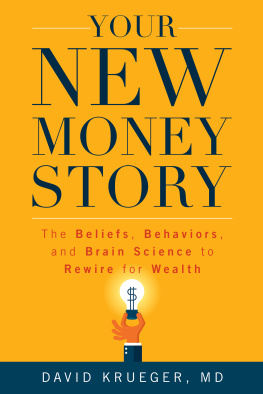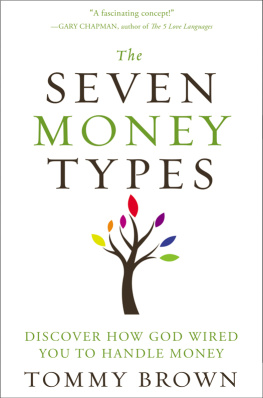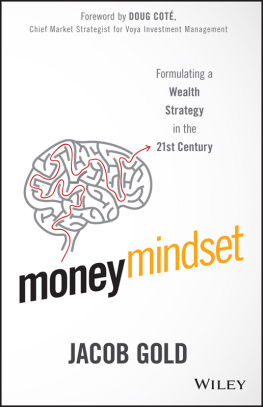WIRED
FOR
WEALTH
Change the Money Mindsets
That Keep You Trapped and
Unleash Your Wealth Potential
BRAD KLONTZ, PSY.D., TED KLONTZ, PH.D.,
AND RICK KAHLER, CFP

www.hcibooks.com
Library of Congress Cataloging-in-Publication Data
is available through the Library of Congress.
2008 Brad Klontz, Ted Klontz, and Rick Kahler
eISBN-13: 978-0-7573-9767-7 (ebook) eISBN-10: 0-7573-9767-0 (ebook)
The names, locations, and other identifying information of the individuals in this book have been changed to protect their privacy. This book contains general information and is not intended to be, nor should it be, used as a substitute for specific medical or psychological advice.
All rights reserved. Printed in the United States of America. No part of this publication may be reproduced, stored in a retrieval system, or transmitted in any form or by any means, electronic, mechanical, photocopying, recording, or otherwise, without the written permission of the publisher.
HCI, its logos, and marks are trademarks of Health Communications, Inc.
Publisher: Health Communications, Inc.
3201 S.W. 15th Street
Deerfield Beach, FL 33442-8190
Cover design by Justin Rotkowitz
Interior design and formatting by Dawn Von Strolley Grove
CONTENTS
Chapter One The Science and Psychology of
Money Scripts
Chapter Two The Top Ten Money Scripts
That Mess Up Peoples Financial Lives
Chapter Three Your Financial Comfort Zone:
Do You Need to Break Out?
Chapter Five When Money Scripts Keep
You Poor in Spirit
Chapter Seven Money Scripts: Whats Your
Family Legacy?
Chapter Eight Financial Rehab: Rewiring Your Money
ScriptsThe Five-Step Process
Chapter Nine When Money Scripts Collide:
Couples in Conflict
Chapter Eleven Change Your Money Mindsets
and Create the Life You Want
W e would like to acknowledge the many people who have supported and continue to support our work. Special thanks first to our spouses: Joni Wada, Margie Zugich, and Marcia Kahler. Without your love, patience, encouragement, and support, this book would not have been possible.
Brad also thanks family members Wanda and James Turner and John and Diane Wada for their ongoing encouragement. Ted appreciates daughter Brenda for handling the all-so-important day-to-day issues, as well as granddaughter Morgan, daughter-in-law Joni, and son-in-law Antoine for their vision and support. Rick is grateful for daughter London and son Davin, who are amazing and the light of his life. He thanks his loyal associates, Darla Creal and Lindsay Luper, for keeping his financial planning clients fully supported and cared for.
Thanks also to the many financial planners, coaches, therapists, and clients we have worked with and learned from over the years. You have been our greatest teachers. We are grateful to our editor, Kathleen Fox, for her contributions, conscientiousness, and hard work. Thanks to Dr. Alex Bivens for his assistance in analyzing our survey data. Thanks also to the great staff at Health Communications, Inc., including Peter Vegso, Gary Seidler, Allison Janse, and KimWeiss.
We also want to acknowledge and honor one another. Our partnership, shared vision, and commitment have helped us forge a new path in integrating financial planning and psychology, and our friendship continues to enrich our lives.
W hats the formula for achieving wealth?
While we can learn much by studying the methods of people who have achieved wealth, many successful people would have difficulty telling you exactly what they did that made the difference. They just worked long hours, kept trying, didnt give up, and made it big. Everyone is different, and it can be very difficult to replicate someone elses method of achieving success.
Although the secret to achieving wealth cant be distilled into a tidy one-size-fits-all formula, the truth is that people who are wealthy think and act differently from those who are not. And in fact, there are discernable patterns of beliefs and behaviors about money that are associated with wealth, and there are patterns that are associated with poverty and financial chaos. These patterns represent your money mindsets, or the ways you think about money and your resulting actions.
The exciting news is that you can change your money mind-sets. If your pattern of thinking about money is associated with destructive financial behaviors, financial distress, and poverty, you can change that pattern to one that is associated with wealth. Regardless of your starting point or your financial situation, you can quite literally rewire your brain for wealth. This book shows you how.
Changing your money mindsets is not a gimmick. It is a process, based on psychological principles and research, to help you identify and change your mental and emotional blocks to success. While this process is intended to help you make money, it will also help you achieve authentic wealth. Certainly, having enough money is a fundamental part of authentic wealth. However, studies consistently show what we know in our hearts to be true: money and material possessions alone bring nothing more than the most fleeting happiness. Providing well for your family, being able to have and do the things that matter to you, and enjoying financial security are all important. Following the advice and completing the exercises in this book will help you remove the barriers that keep you from becoming rich.
Equally important, however, is the ability to use financial wealth to support a balanced, fulfilling, passionate life. Financial success is only one of the many benefits that can come from changing your money mindsets. A change in mindsets will also allow you to enjoy the wealth you may already have. Rewiring the money beliefs that block your financial potential can lead to wiser financial choices, more balance in your life concerning money, improved relationships, and increased wealth and financial comfort.
As important as these benefits are, changing your money mindsets can transform your life in even more significant ways. This is due to the incredible consequences of money-related stress. When money is a source of stress, that stress influences every aspect of your life. Recent research has shown that stress about money issues affects not only your mental state but also your physical health. A June 2008 poll conducted by the Associated Press suggests that stress about money matters is an important health factor. People who worried about money reported more migraines, ulcers, anxiety, and incidences of severe depression. You have limited control over many external factors that affect your financial environment (for example, job loss, recession, high-tech bubble burst, subprime mortgage crunch). What you can control, however, are your own thoughts and subsequent actions (or inaction) within that environment. In our clinical, professional, and personal experience, these internal factors will be the major determinant of your ultimate success.
Accepting your roleand the fact that you have onein your financial situation is the first step in ensuring that you dont continue to make the same mistakes. Using the tools in this book, you can examine and learn to change the beliefs you have about money that are not serving you well. You can learn how to rewire your beliefs to set you on a path to financial success and less money stress.
Wired for Wealth is based on a combination of hands-on experience and research. We are pioneers in the practical application of the psychology of personal finance and wealth. Dr. Brad Klontz is a clinical psychologist, psychotherapist, and researcher. Dr. Ted Klontz has been a psychotherapist and life coach for more than thirty-five years. Rick Kahler has been a fee-only certified financial planner for twenty-five years. We all work with clients on a daily basis, and together we have decades of experience in helping clients to build wealth, change self-limiting patterns of behavior, and create more fulfilling lives.
Next page











